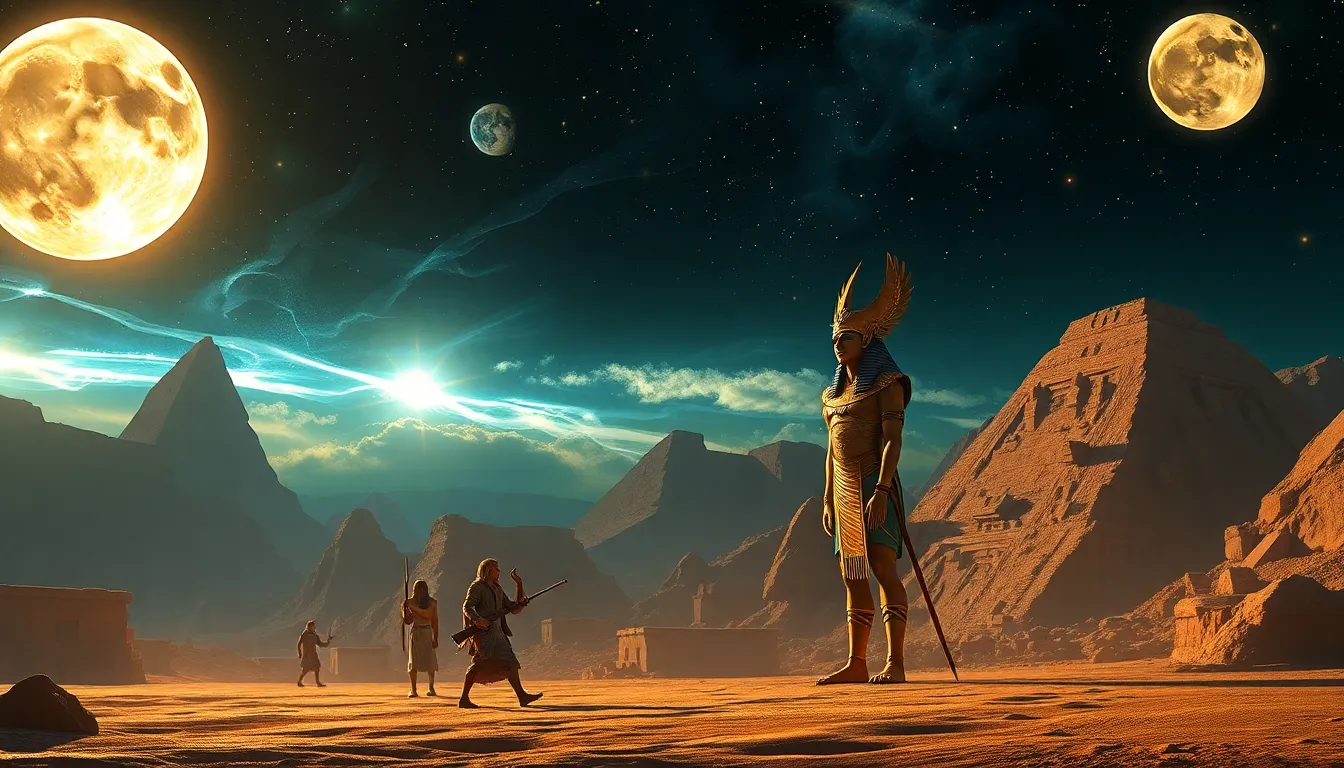The Lunar Legends of Ancient Egyptian Heroes
I. Introduction
Ancient Egyptian mythology is a rich tapestry of deities, heroes, and cosmic phenomena, woven together to explain the mysteries of the universe. Central to this mythology is the moon, a celestial body that held great significance in the lives of the Egyptians. The moon was not just a source of light in the night sky; it was revered as a powerful symbol of time, fertility, and the divine. This article delves into the lunar legends associated with the heroes of ancient Egypt, revealing the profound connections between lunar deities and the heroic narratives that shaped Egyptian culture.
II. The Role of the Moon in Ancient Egyptian Mythology
The moon played a multifaceted role in ancient Egyptian beliefs, symbolizing various aspects of life and spirituality.
- Symbolism of the Moon: The moon was often seen as a symbol of regeneration and rebirth, reflecting the cycles of life, death, and renewal. It was associated with the night, mystery, and the feminine.
- Lunar Cycle and Agriculture: The Egyptians closely monitored the lunar phases, which influenced agricultural practices. The moon’s cycles were crucial for planting and harvesting crops, ensuring the sustenance of their civilization.
- Key Lunar Deities: Two prominent lunar deities were Khonsu, the god of the moon, and Thoth, the god of wisdom and writing. Both played significant roles in various myths and were revered throughout the ancient Egyptian pantheon.
III. The Heroic Deeds of Khonsu
Khonsu, the youthful lunar god, was not only a celestial figure but also a protector of the people. His adventures embody the valor and heroism celebrated in Egyptian culture.
- Khonsu as the Lunar God: Khonsu was depicted as a young man with a sidelock of youth and a crescent moon on his head. He symbolized the moon’s phases, representing the cyclical nature of life.
- Myths of Khonsu: One famous myth involves Khonsu’s battle against the serpent Apophis, a symbol of chaos and destruction. In this tale, Khonsu’s bravery and strength helped restore order, showcasing his role as a protector of the cosmos.
- Significance of Khonsu’s Heroism: Khonsu’s exploits were not only tales of adventure but also moral lessons that highlighted the values of courage, loyalty, and the importance of upholding Ma’at, the principle of truth and cosmic order.
IV. Thoth: The Wise Hero of the Moon
Thoth, often depicted as an ibis-headed god, had a dual role as both the god of wisdom and the moon, acting as a mediator in various myths.
- Thoth’s Dual Role: As the god of wisdom, Thoth was revered for his intellect and understanding. His lunar aspect represented the reflective qualities of the moon, symbolizing knowledge and enlightenment.
- Tales of Thoth: Thoth often intervened in conflicts among the gods, using his wisdom to resolve disputes. In one notable myth, he mediated between Osiris and Set, highlighting his role as a guide for heroes.
- Contributions to Writing: Thoth is credited with the invention of writing and the development of hieroglyphs, which played a crucial role in preserving Egyptian history and culture, further solidifying his status as a hero of knowledge.
V. Lunar Legends and Their Influence on Heroic Narratives
Lunar legends have a profound connection to the journeys of heroes, often reflecting the phases of the moon in their narratives.
- Connection to Lunar Phases: The waxing and waning of the moon mirrored the trials and tribulations faced by heroes, symbolizing growth, challenges, and eventual triumph.
- Examples of Heroes: Many heroes, such as Horus and Osiris, had their stories intertwined with lunar events, often depicting their struggles against chaos and their journeys towards restoration and balance.
- Impact on Moral Frameworks: The heroes’ journeys in lunar myths served as moral lessons, teaching values such as bravery, justice, and the importance of wisdom in overcoming adversity.
VI. The Significance of Lunar Festivals in Honoring Heroes
Lunar festivals played a vital role in ancient Egyptian society, serving as occasions to honor lunar deities and their heroic deeds.
- Major Lunar Festivals: Festivals such as the Feast of the Moon celebrated Khonsu and Thoth, where rituals and offerings were made to honor their contributions to the cosmos.
- Celebrations and Rituals: These festivals included music, dance, and storytelling, where the heroic tales of lunar deities were recounted, reinforcing their significance in the cultural consciousness.
- Cultural Values: Lunar festivals emphasized community, spirituality, and the importance of the natural cycles, reinforcing the values that shaped Egyptian identity.
VII. Interpretations of Lunar Legends in Modern Context
Today, the lunar legends of ancient Egypt continue to inspire and resonate within contemporary culture.
- Influence on Modern Literature and Art: The themes of heroism and wisdom found in lunar myths have permeated modern storytelling, influencing authors, filmmakers, and artists who draw inspiration from these ancient tales.
- Relevance in Today’s Society: The moral lessons embedded in these legends remain relevant, offering insights into the human experience and the timeless struggles of good versus evil.
- Resurgence of Interest: The growing fascination with ancient mythology has led to renewed interest in lunar legends, as people seek to understand the cultural heritage that shapes their identities.
VIII. Conclusion
In summary, the lunar legends of ancient Egypt provide a fascinating glimpse into the spiritual and cultural significance of the moon in shaping heroic archetypes. Through the stories of Khonsu and Thoth, we uncover the values of wisdom, bravery, and justice that continue to resonate today. These ancient myths not only enrich our understanding of Egyptian culture but also highlight the enduring power of mythology in connecting us to the past and to each other.




